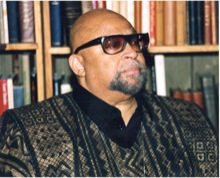FCNNEWSSOURCE
Dr. Maulana Karenga is the creator of Kwanzaa, a professor in the Department of Black Studies at California State University-Long Beach and chair of the African American Cultural Center and organization Us, located in Los Angeles. He is the author of “Kwanzaa: A Celebration of Family, Community and Culture, Kawaida and Questions of Life and Struggle” (a collection of commentaries on critical issues), and the “Million Man March/Day of Absence Mission Statement,” among other works. Dr. Karenga recently sat down for an interview with Final Call Western Region Correspondent Charlene Muhammad about the creation and impact of Kwanzaa, (www.OfficialKwanzaaWebsite.org) and (www.MaulanaKarenga.org).
FINAL CALL (FC): Why did you decide to create Kwanzaa? Was there a specific individual incident that compelled you or a variety of reasons?

DR. MAULANA KARENGA (MK): I created Kwanzaa as part of my work as an activist-scholar in the Black Freedom Movement and thus it reflects movement concerns, principles and practices such as cultural grounding, unity, self-determination, social justice, historical consciousness, cooperative practices and responsibility, and community building and struggle. I created Kwanzaa in this context, then, for three reasons: (1) to reaffirm our rootedness in African culture and facilitate our return to our own history and culture; (2) to give us as African people, a special time to come together, reinforce the bonds between us and mediate on the awesome meaning of being African in the world; and (3) to introduce and reinforce the importance of African communitarian values, values that stress and strengthen family, community and culture, especially the Nguzo Saba (The Seven Principles). And these are: Umoja (Unity), Kujichagulia (Self-Determination), Ujima (Collective Work and Responsibility), Ujamaa (Cooperative Economics), Nia (Purpose), Kuumba (Creativity), and Imani (Faith).
FC: When you created Kwanzaa in 1966, what did you see as the ultimate need that it would help fulfill in people?
MK: Kwanzaa was created to build on the best of African thought and practice using models and teachings of excellence and achievement of our culture, ancient and modern, continental and Diaspora, to aid us in our struggle for liberation and to build good, meaningful and expansive lives. It was thus not created to solve problems, but to enhance our lives, building on our strengths and our best ideas and practices.
FC: How did you develop the total concept and then each principle?
MK: I conceived and constructed Kwanzaa through deep and wide-ranging research, study and reflection on African cultures, extracting ancient and modern models and meanings that spoke to the best of what it means to be African and human in the fullest sense. This meant learning African languages, concepts and customs and searching for and incorporating visions and ways of being ethical and excellent in the world.
FC: Why seven principles specifically?
MK: I chose Seven Principles that I reasoned reflected the communitarian spirit of African culture and central goals and goods of the movement. And I chose “seven” for the special spiritual and cultural significance of the number seven in African culture and the value it has for facility in learning and practice.
FC: What was the initial reaction to the idea and then when Kwanzaa materialized?
MK: The initial reaction to Kwanzaa was excitement and commitment in our organization, Us, interest and acceptance in the larger nationalist community, and curiosity, questioning and gradual appreciation in the African American community as a whole when they heard about it or experienced it. But eventually, it received, as you know, a warm and wide reception because of the special and specific cultural meaning it has for us as African peoples in a multicultural society and world.
FC: Looking back to 1966 when you created Kwanzaa, in your view what has been its greatest impact since then?
MK: I think the greatest impact of Kwanza has been its ever increasing importance as a major cultural reference point and shared value system that: (1) provides us with a shared set of ethical and social principles and practices; (2) reaffirms cultural grounding for us as persons, family, organizations and institutions; (3) unites us around the world in ways no other cultural practices does; and (4) encourages us and enhances our capacity to remember, reaffirm and speak our special cultural truth in a multicultural world.
FC: Now 40 million-plus, if I understand correctly, over the world celebrate Kwanzaa. Your thoughts on how it’s spreading?
MK: Clearly, I feel blessed and honored to see my work flourish in my lifetime; to witness Kwanzaa’s embrace by over 40 million Africans throughout the world, the African community on every continent in the world and to see and regularly receive evidence of the various ways our people discuss, teach, use and practice the Seven Principles, the Nguzo Saba, all year round in countless ways. And I am profoundly grateful to our organization, Us, for accepting it first and sharing it with Africans around the world; to the nationalist community who embraced it and expanded the sharing and, of course, to our people as a whole who made it the Pan-African and world-encompassing holiday it is today.
FC: Lastly, what do you envision for Kwanzaa and its celebrants in the future? What is your ultimate goal/vision for it and are we, the world, on our way?
MK: My vision for Kwanzaa and its celebrants, and indeed for our people, is that we will continue to embrace, discuss, reflect on and practice the Nguzo Saba to achieve and sustain the goals and good inherent in the principles–unity, self-determination, collective work an responsibility, cooperative economics, purpose, creativity, and faith. For I see these core principles and practices key to the ongoing struggle we wage to repair, renew and transform ourselves and the world, to begin a new history of humankind, and create an ever-expanding realm of human freedom, flourishing and good in the world.
FC: Thank you.












